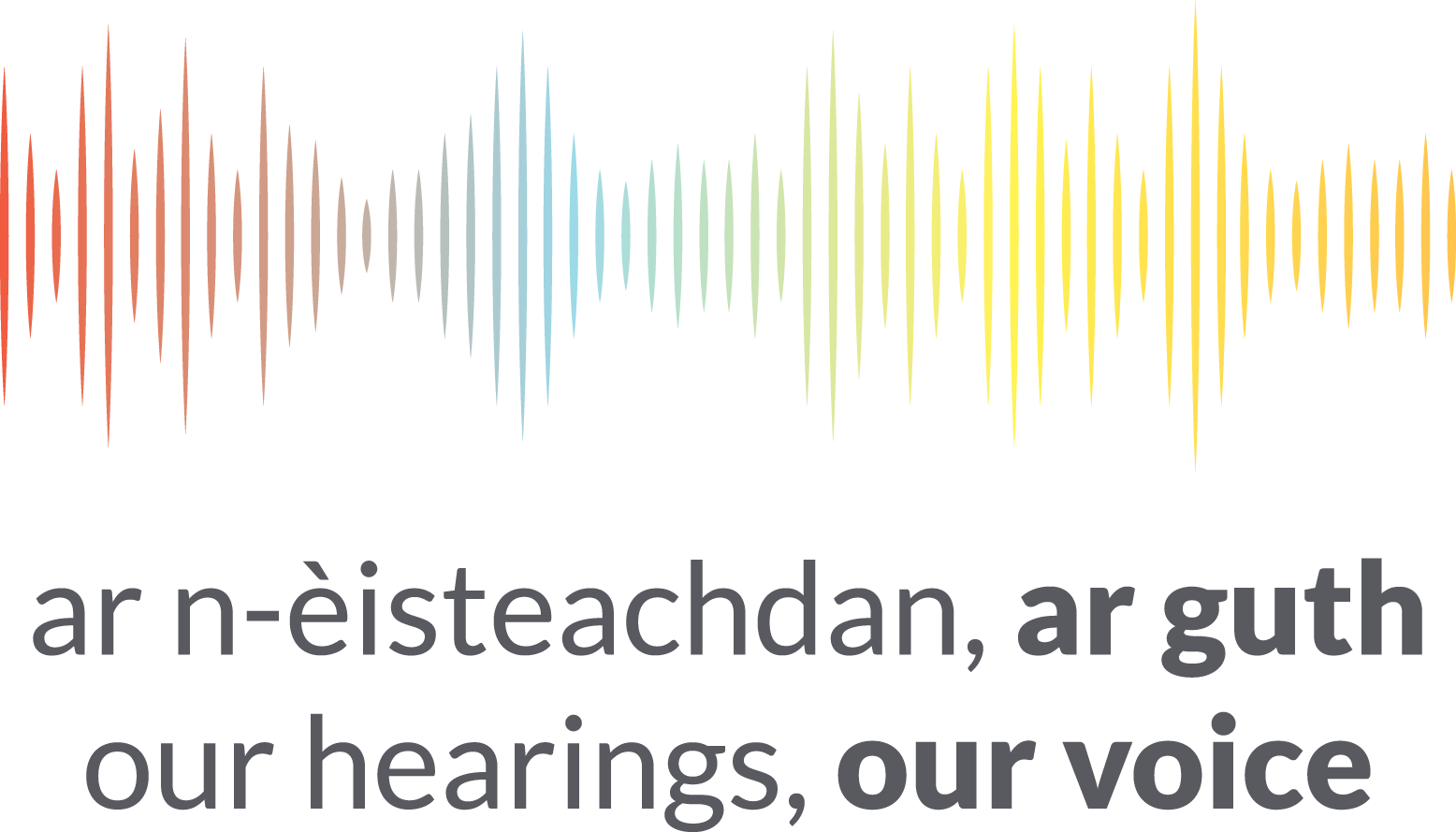Board members Dylan and Andrew were invited by Children’s Hearings Scotland to deliver a presentation to 84 panel members at a training day at Forth Valley College, Falkirk. Reflecting on their own experience of Hearings and considering what other OHOV board members have shared in the past, Dylan and Andrew put together a presentation about what young people say matters to them in their Hearings.
They started by sharing the 40 Calls to Action, highlighting some examples of asks that panel members have the power and capacity to fulfil, for example:
- There should be fewer professionals in the room
- I should have the power to decide where everyone sits in my Hearing
- Hearings should be kept as short as possible
- I must be supported to speak freely at my hearing
Dylan and Andrew focused on one call in particular: ‘Speak to me using words and explain things in a way I will understand’. They went on to talk about how the right language has the power to support children’s confidence and participation, citing a quote from board member Lewis:
“I’ve been told some positive things in hearings before; they’ve talked about how much I’ve matured and grown up and that made me feel quite good about myself, and how far I’ve come. When people use the right language it can make a positive difference to me, like being recognised for your efforts”
They went on to discuss how important it is to exercise caution around certain positive words or phrases that place unrealistic expectations or pressure on children, such as ‘resilient’ and ‘articulate’. They explained that when a child is referred to as resilient, they might feel that they aren’t allowed to express distress when things aren’t going well in their lives. ‘Articulate’ is another example of a well-meaning label that could put pressure on children to hide the fact that they don’t understand the meaning of a word/phrase in their Hearing.
This seemed like a suitable time to show the audience our virtual Language Bin, which has been used by children and young people across Scotland a total of 2192 times to date. Users can virtually ‘bin’ words on the site that they’ve heard in Hearings before and didn’t like, or submit words of their own. As of April 2024 there have been 110 individual words/phrases binned by young people visiting the site. Andrew and Dylan shared the Results Page of the site to show panel members which words have been ‘binned’ the most over time.
It’s not always easy to predict the words and phrases that individual children may not like, as everyone is, of course, unique. Andrew stated that a word that is suitable for one child might upset another. For instance, some children do not like the word ‘contact’, preferring, ‘family time’. Others might see their foster parents as their family, and would therefore prefer ‘contact’. To help with this, Andrew recommended that panel members refer to the language principles developed as part of a project called ‘Language Leaders’ The principles are as follows:
- Words will be personalised to meet the individual needs of the child, including taking account of the child’s own wishes and use of language
- All language used will be clear, easy to understand and will support children to be involved in decision making
- Reports, letters and discussions will reflect the strengths and positives in children’s lives, ensuring they are balanced against any challenges and risks
- Only language which is non-stigmatising and protects children from blame or distress will be used
Dylan highlighted the second language principle, talking about how confusing it can be for children to hear complex language or acronyms in their Hearing. Several panel members agreed with this, with one woman stating that panel members themselves often struggle with the legal jargon within written reports.
Dylan and Andrew moved the focus beyond language to discuss examples of good communication in general, and the difference this can make for children. They quoted board member Abbie:
“When I’m at the centre of my hearing and you ask me questions and listen to my thoughts, I feel involved”
Andrew told the panel members, ‘We feel more involved in our hearing when adults speak to us directly whenever possible, rather than choosing to speak to adults. When you speak to us and listen, it shows that you value what we have to say and will take our thoughts into consideration when making important decisions about our lives.’ Even something as simple as using a child’s name during their Hearing can make a child feel more involved and respected, as highlighted by this quote from board member Zodie:
“When you use my name you make me feel like ‘someone’, not just ‘anyone’”
It’s important that the panel take the time to show a child they’re listening to them and trying to get to know them, rather than judging them based on paperwork and stereotypes. Andrew told the panel members, ‘One of our 40 Calls says, Do not judge me, get to know me. Try to step into my shoes and understand what my life is like and what is important to me. This is really important; we shouldn’t feel that you’ve made up your mind about us based on our paperwork’. Dylan then shared a video of board members Zodie and Poppy talking about how degrading it can feel when they are stereotyped or compared to other young people their age.
After the presentation, the audience were invited to pose questions to Dylan and Andrew. One panel member asked whether Dylan and Andrew would ever consider becoming panel members in the future. Andrew said this is something he had thought about and would be open to pursuing. Another panel member asked why they thought more and more children were opting not to attend their Hearings these days. Andrew said that if children are not supported to share their views and are not listened to, they will be less likely to see the value of attending Hearings. He went on to say that children are the experts in their own lives, and should be asked about what matters to them.
After the Q&A session Andrew and Dylan were approached by numerous members of the audience, who commended them for their presentation skills and confidence. Even more encouragingly, many of them stated how valuable the session had been and that they had learned a lot by listening to young people speaking directly about what matters to them. One panel member stated that she hoped there would be more opportunities for this kind of learning in the future.
We are immensely proud of all our board members and we love hearing positive feedback in response to their work. We were delighted to receive the following comments from panel members, following Andrew and Dylan’s input:
“I think the two young men, Dylan and Andrew were superb. They could be a real challenge to Ant and Dec!”
“It was a very interesting and inspiring presentation, delivered with enthusiasm, wit and confidence.”
“It was nice to hear that Andrew is considering becoming a panel member and Dylan would like to join the police. It was particularly pleasing to hear that their motivation is to make a difference. Given their experience in the care system, I reckon their contribution will be invaluable.”

